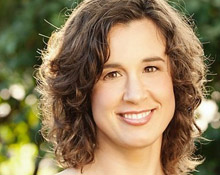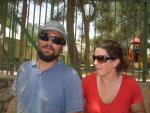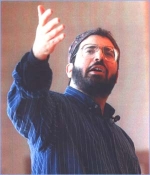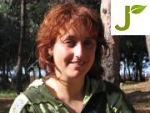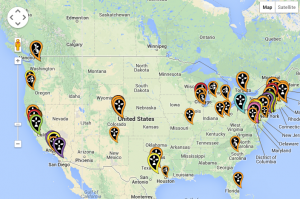Weekly Parsha / Torah Portion Subscribe
A selection of initiatives, blogs, resources and communities on Jewcology which focus on the weekly Torah portion.
From the Blogs
Eden Village is hiring farm educator apprentices for 2015 growing season!
Eden Village Camp is Hiring! Submit Your Application About Eden Village Camp: Eden Village Camp aims to be a living model of a thriving, sustainable Jewish community, grounded in social responsibility and inspired Jewish spiritual life. By bringing the wisdom of our tradition to the environmental, social, and personal issues important to today’s young people, we practice a Judaism that is substantive and relevant. Through our Jewish environmental and service-learning curricula, joyful Shabbat observance, pluralistic Jewish expression, and inspiring, diverse staff ...
“Farm the Land Grow the Spirit Summer 2015″
flgs_2015 This ia a free opportunity for young adults 19-29 to come together in an interfaith setting for Jews, Christians and Muslims to live, farm and study together from June 1st - July 23rd 2015 at the Stony Point Conference Center in Stony Point, NY, with time for mentoring and vocational discernment. It is a Multifaith, Peace, Justice and Earthcare program. We seek students who are grounded in their religious tradition, serious about spriiuality and the state of the planet, and open to learnig and living in an intentional community setting. This is our 6th ...
Vayetzei: Sunset to Sunrise (by NEESH NOOSH)
This post originally appeared on Neesh Noosh: A Jewish Woman's Year Long Journey to Find Faith in Food. In Vayetzei, we read that Jacob leaves Beer-sheva at sunset to travel to Laban's house. Jacob is at Laban's house for 20 years, during which time he faces many challenges and uncertainties that shroud his life in darkness. After the 20 years there, he leaves Laban's house at sunrise. The Etz Hayim commentary describes "the 20 years at Laban's house as a 'dark night for the soul,' years spent struggling with the dark forces represented by Laban's treachery and Jacob's ...
Parshat Chayyei Sarah: The Answering of Our Prayers Before We Speak them—Especially Outdoors
by Rabbi Katy Z. Allen Connections. Everything is about connections. Connections across space. Connections across time. Connections in thought and spirit. Connections between. Connections among. Just connections, nothing else. That's what prayer is about. That is what faith is about. That is what life is about. In this week’s parashah, Chayyei Sarah, “Isaac went forth to [lasuach] in the field toward evening.” (Gen 24:63) The rabbis teach us that lasuach has the meaning, “to pray,” and they provide a connection to Psalm 102:1, which begins, “A prayer ...
Parashat Sh’mot – Heirloom Seeds, Our Ancestors, and Friendship
by Rabbi Katy Z. Allen My first seeds from the Seed Library arrived in the mail today, part of a gift membership that I had given to myself. Gift packets to my two sons arrived in their mail as well. The packet is artistic, aesthetic, and pleasing not only to the eye, but also to the heart and the soul. Every packet is designed by a different artist. Inside are heirloom seeds, in the one I received are Purple Podded Peas. These are peas that grow 5-6 feet high, have scarlet blossoms, and produce dried peas good for soups and other winter dishes. I am ...
The Torah Verse That Turned Two Meat-Eaters into Beet-Eaters
You don’t need to unfurl the Torah scroll too much, or turn too many pages in your Bible, to find the foundational verses of religion-based vegetarianism. It’s right there in the opening chapter of Genesis. Discovering this changed The Beet-Eating Heeb’s life and the life of Wife of BEH, too. Their discovery occurred on Rosh Hashanah morning, 5766, when The Beet-Eating Heebs were still meat-eating Heebs. The morning’s service had plodded along for two hours or so when the Torah was taken from the Ark to be read. At this point, ...
Jacob’s Lentil Stew MMMMM…..
Winter is around the corner. Along with it comes the relatively colder air (we are in Beersheba), and relative rain (again, Beersheba). Nonetheless, the winter plantings have begun. It is a fantastic time of year where the Earth somehow can tell; you are really craving a warm bowl of veggie soup. Of course there are all of the tubers and roots, like potatoes, carrots, radish , onions, and garlic. Then there are the leaves and stalk such as celery, parsley, and cilantro. Don’t forget beans and lentils are also winter crop varieties. The Torah is also in line with ...
Earth Etude for 19 Elul
Personal ethics in the face of climate change by Susie Davidson In his master work "Walden," Henry David Thoreau wrote, "We do not ride on the railroad; it rides upon us." Thoreau, who is largely credited as a forefather of the environmental movement, was issuing a dire warning that progress can, ultimately, lead to enslavement. He sensed that for all the conveniences that new modes of transportation, farming, communication and manufacturing could provide, we would ultimately become, for all intents and purposes, mere cogs entwined ...
New Year of Jewish Learning on the Environment Materials Released!
The tenth topic in the Year of Jewish Learning on the Environment, Water: Appreciating a Limited Resource, has just been released! Human beings depend on a sufficient supply of high quality fresh water for their survival. Because of this essential dependence, Jewish sources equate water with life. By recognizing our dependence on water, and ultimately our dependence on G-d, we can strengthen our appreciation and protection of our precious natural resources, and our relationship with the Creator of the world. See all Passing the Test of Water: ...
Pashat Pinchas – How Much Strawberry Shortcake Should I Eat?
This week's Torah portion, Pinchas, contains instructions about how the Israelites are to divide up of the land once they arrive: "The Lord spoke to Moses, saying, 'Divide the land among the tribes, as an inheritance according to the number of the names: with larger groups increase the share, with smaller groups decrease the share. Each is to receive its share according to its enrollment.'" (Num. 26:52-54). The land is to be divided up among the tribes, and it must be done fairly. It matters not only what is done, but how it is done. ...
Shabbat and Environmental Awareness Materials Released – Year of Jewish Learning on the Environment
The fifth topic in the Year of Jewish Learning on the Environment, Shabbat and Environmental Awareness, has just been released! Today we live in a society which is constantly doing without sufficient regard to being, and at the same time, transforming the natural world without taking time to reflect on the long-term consequences. Shabbat as a spiritual practice offers great potential to reduce consumption and thereby benefit the natural world. In addition to our summary article, longer article, source sheet and podcast, we are proud to ...
New Materials Released for Year of Jewish Learning on the Environment!
The fourth topic in the Year of Jewish Learning on the Environment, Sustainability in the Land of Israel, has just been released! Rabbinic teachings on Yishuv Eretz Yisrael (settling the land of Israel) highlight the common Jewish duty to live sustainably. Our Sages made short-term sacrifices in order to preserve their resources, actions we should emulate to help us find ways for today's reality on the Land. See all Sustainability in the Land of Israel Materials! Share Year of Jewish Learning Materials with your community. ...
When is the right time?
I was having a good deal of trouble figuring out what I wanted write about this month on Jewcology. As I was searching for a topic I thought about doing a search for Jewish environmental poetry. The first passage that came up in my search was the following: Kohelet (Ecclesiastes) 3:1-8 For everything there is a time and a season for every experience under the heavens: A time to birth and a time to die, A time to plant and a time to uproot the planted; A time to kill and a time to heal, A time to breach and a time to build; A time to cry and a ...
Jewcology Launches Year of Jewish Learning on the Environment!
This Tu b'Shevat, Jewcology will launch a major new program: a Year of Jewish Learning on the Environment, in partnership with Canfei Nesharim. Between Tu b'Shevat 5772 and Tu b'Shevat 5773, we will roll out our "Core Teachings" series, 18 sets of resources exploring the connection between Jewish texts and our response to today's environmental challenges. Topics range from Trees, Food and Energy to Shabbat, Sustainable Use and Consumerism. For each topic, we will be providing a long article (2000 words), short article (800 words), ...
Veguary for the Environment
The month of February has become “Veguary” for hundreds of people around the world. A combination of the words vegetarian and February, Veguary describes a new trend to “pledge to be a veg,” or to commit to eliminating or reducing meat eating habits for one month each year. Initiated by three students at Manhattan’s Abraham Joshua Heschel School, Veguary is gaining popularity around the world as it encourages awareness of the environmental and health problems that can be caused by overconsumption of meat. Read more about Veguary and find a ...
Take Care Reproducing Documents (CJN May 2011)
This "Sustainable Jew" column originally appeared in the Canadian Jewish News May 12, 2011 We are now in “sphirat ha-omer,” the count-up to Shavuot—the time of the giving of our Torah. Our study and transmission of our Written and Oral Laws ("Torah Shebichtav" and "Torah Sheba'al Peh," respectively) has benefitted from technological advancement. We are known as the “People of the Book”—five books of Moses, 24 books of Tanakh, countless written commentaries—but many are beginning to find ...
Seeds
(reposted from Rabbi Nina Beth Cardin's blog: http://blog.bjen.org/ dated January 6, 2012) In Genesis 1, on the sixth day, God creates man and woman after having created all the rest of Planet Earth. In a gracious effort to provide some guidance, some instruction to these bewildered, befuddled neophytes on how this novelty of life could possibly work, God says, "Look around. All this grandeur is there for you." 28 God blessed them and said to them, “Be fruitful and increase; fill the earth and subdue it. Rule over the fish in the sea and ...
The Tower of Babel
I’ve been thinking lately how all stories are created in the image of their tellers, and all tellers are created in the image of life, and all life is created in the image of the Holy One, Tzelem Elohim. In this way, all stories contain sparks of holiness. After all, Reb Nachman of Bratzlav says that every story has something that is concealed. What is concealed? Nothing less than the hidden light from the beginning of creation! This is why no story is too small for our attention. For instance, this past week, Noah receives so much attention, and ...
thoughts about sustainability – from Noach to Abraham
Einat Kramer “And the bow shall be in the cloud; and I will look upon it, that I may remember the everlasting covenant between God and every living creature of all flesh that is upon the earth.” Genesis 9:16 Parshat Noach details a terrible ecological disaster, the Flood that immerses the world in water and brings an end to all life – all because of man’s despicable behavior. In this parsha we meet Noach, the first “environmental activist” who acted upon a divine commandment to keep every species of animal ...
The Holiness of Eating
This weeks Torah parsha, Shemini, begins on the eighth day of the ceremony to ordain the priests and consecrate the Tabernacle. Moses instructed Aaron to assemble several types of animals and a meal offering as sacrifices (called korbanot in Hebrew) to God, saying: “Today the Lord will appear to you." (Leviticus 9:1–4.). At one point, Moses becomes angry at Aaron and his sons for failing to eat the sin offering at the proscribed time and place. The parsha concludes with a listing of which animals are considered clean and therefore permissible ...

